Human Biology and Behaviour
with a Year Abroad
Find out what it really means to be human through the study of our evolution, biology and psychology.
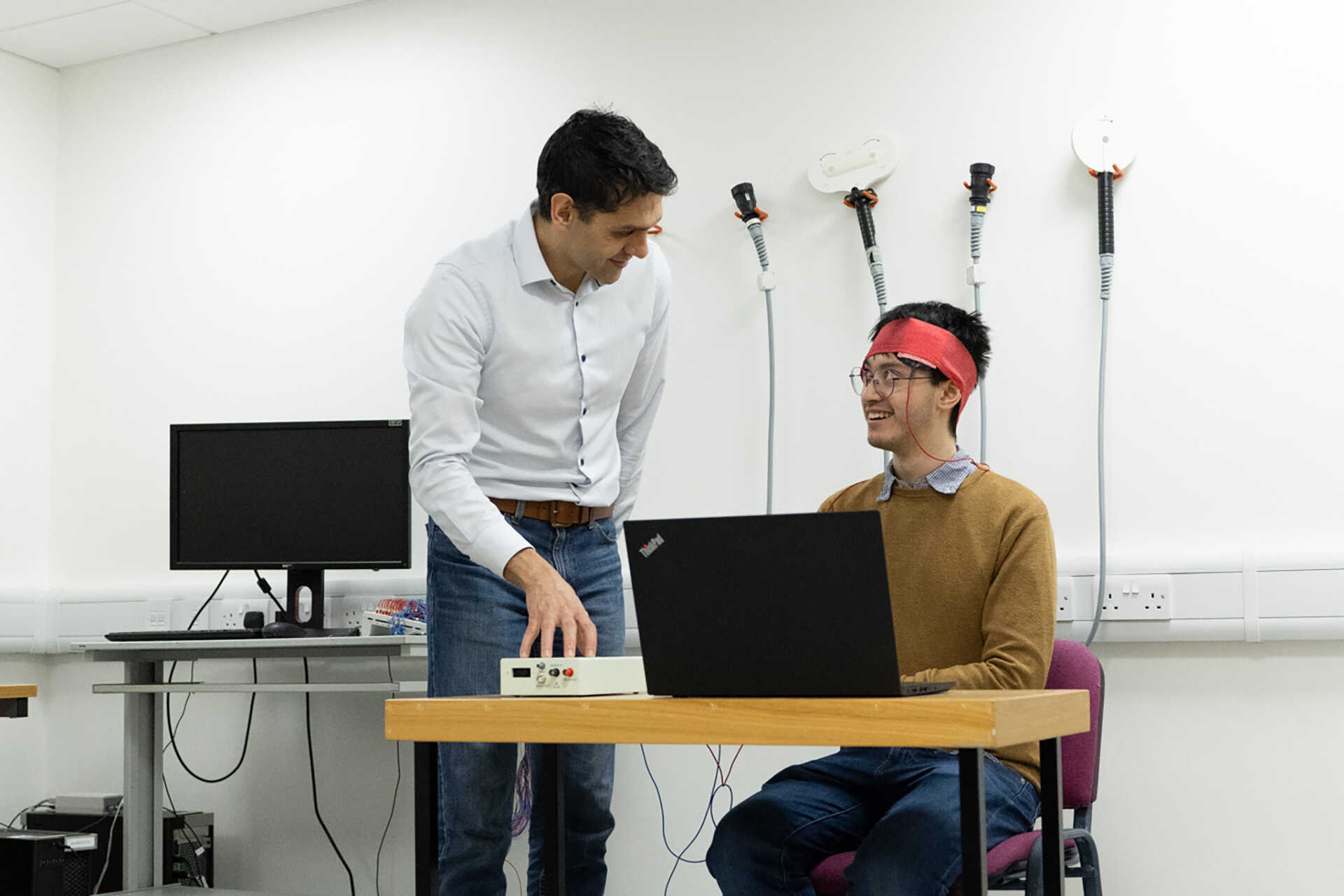
Find out what it really means to be human through the study of our evolution, biology and psychology.
Test your curiosity and ask challenging questions like: how do hormones influence our behaviour? What are friends for? What happens when we die? We will give you the skills and confidence to examine evolution, anatomy, psychology, the behaviour of humans, and our living and fossil primate relatives.
Answer a variety of compelling questions about sex and reproduction, social systems and whether other primates have a language. Gain academic and practical skills that prepare you for careers in the fields of health, science, education, scientific communication, as well as community and social services, among others.
The year abroad extends your degree to a four-year programme and typically allows you to spend a year studying at one of our partner institutions in the US or Canada.
You can also shape your degree outside the classroom with extracurricular activities such as open lectures - attracting global figures and our thriving student-led societies.
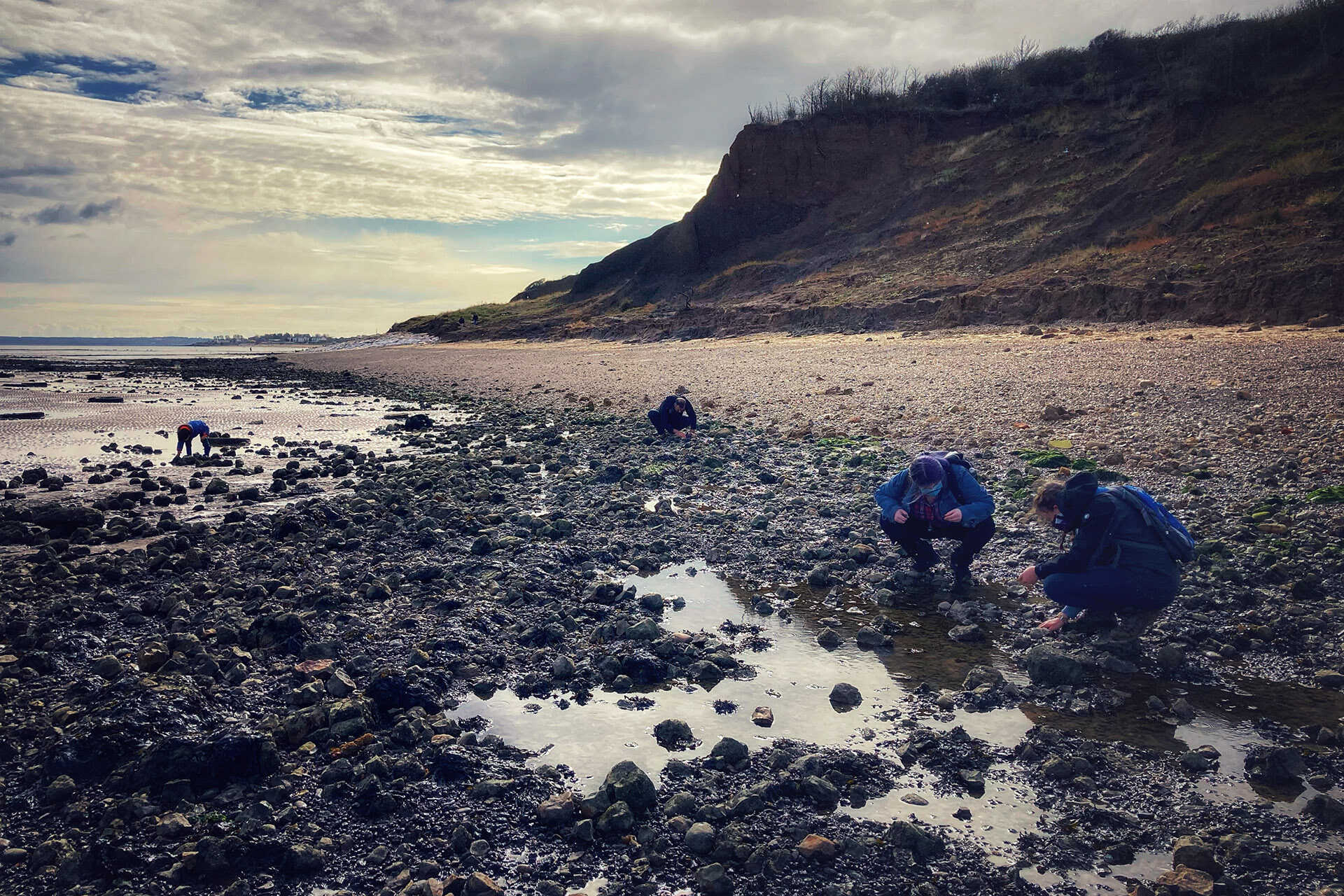
Bring your learning to life with excursions to animal parks, archaeological sites and skeletal collections.
of final-year Anthropology students were satisfied with the quality of teaching on their course in The Guardian University Guide 2023.
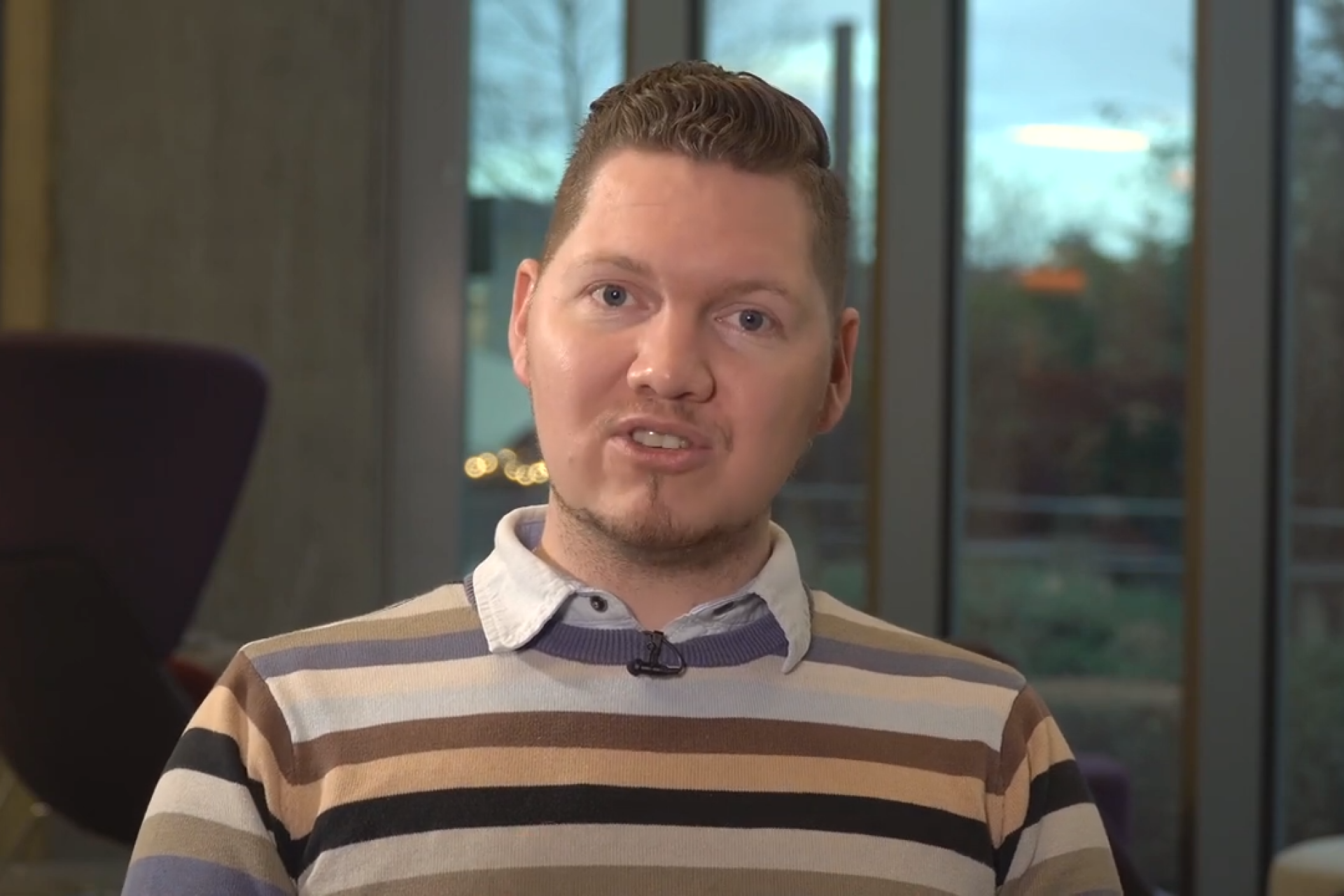
Dr Devin Finaughty explains how you receive a broad foundation in the subject before focusing your studies.
Excellent staff-student ratio, regular workshops and alumni talks, dedicated academic advisors and a peer mentoring scheme.
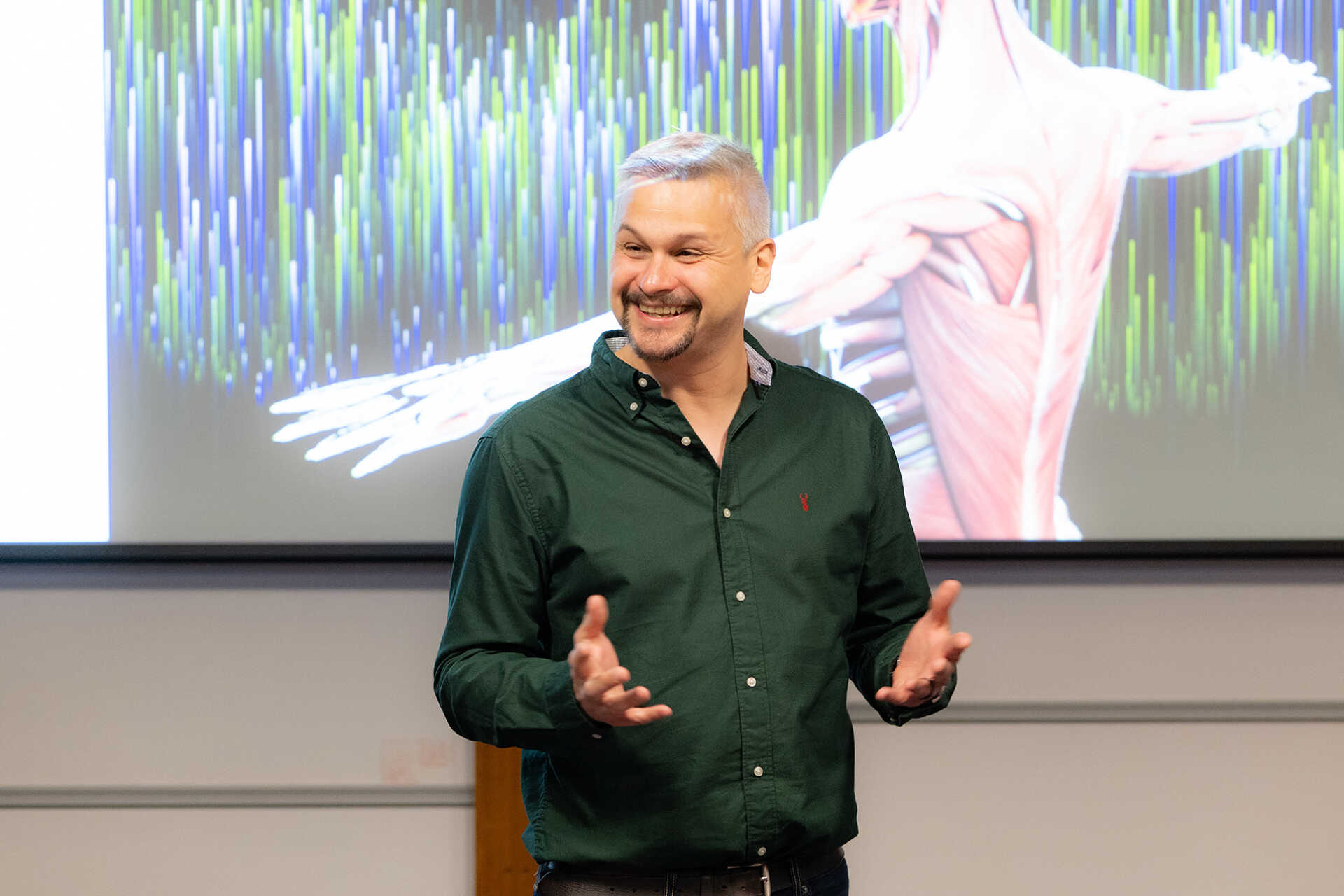
Be inspired by academics at the forefront of their fields including biological, environmental, and evolutionary anthropology, as well as Biology and Psychology.
The University will consider applications from students offering a wide range of qualifications. Click below to find out more. Please also see our general entry requirements.
BBB including at least one of Human Biology, Biology, Psychology, Chemistry or Mathematics.
DDM. Please note that subjects such as Hospitality, Catering, Art & Design, Music, Photography and Dance will not be accepted.
120 Tariff points from your IB Diploma, Typically H5, H6, H6 or equivalent.
Mathematics grade C/4
Pass the University of Kent International Foundation Programme.
The University will consider applicants holding T level qualifications in subjects closely aligned to the course.
Obtain Access to HE Diploma with 45 Credits at level 3 with 24 credits at Distinction and 21 credits at Merit.
You must take the following compulsory modules plus at least 15 credits from the following optional modules. The remaining 15 credits can be taken from the optional modules listed or from elective modules.
This module is an introduction to biological anthropology and human prehistory. It provides an exciting introduction to humans as the product of evolutionary processes. We will explore primates and primate behaviour, human growth and development, elementary genetics, the evolution of our species, origins of agriculture and cities, perceptions of race and diversity, and current research into human reproduction and sexuality. Students will develop skills in synthesising information from a range of sources and learn to critically evaluate various hypotheses about primate and human evolution, culture, and behaviour. This module is required for all BSc Anthropology students. The module is also suitable for students in other disciplines who want to understand human evolution, and the history, biology, and behaviour of our species. A background in science is not assumed or required, neither are there any preferred A-levels or other qualifications. The module is team-taught by the biological and social anthropology staff.
This module will consider the anatomy and function of normal tissues, organs and systems and then describe their major pathophysiological conditions. It will consider the aetiology of the condition, its biochemistry and its manifestation at the level of cells, tissues and the whole patient. It may also cover the diagnosis and treatment of the disease condition.
Indicative topics will include:
• Cells and tissues
• Membrane dynamics
• Cell communication and homeostasis
• Introduction to the nervous system
• Cardiovascular system
• Respiratory system
• Immune system and inflammation
• Blood cells and clotting
• Urinary system
• Digestive system, liver and pancreas
This module introduces students to the study of psychology, with the aim of providing an introductory understanding of key topics within psychology and seminal psychological research. The module explores psychology as a science and the research methods common in psychological research. The lectures will cover some of the key concepts and findings in the study of abnormal psychology, sensation, consciousness, child psychology, motivation, emotion, memory and attitudes, and group processes. The module encourages students to explore classical concepts in psychology within the context of cutting edge research and contemporary issues within modern society. There is a particular focus on how psychology and concepts within the subject can inform controversial issues in everyday society.
This module introduces students to the study of psychology, with the aim of providing an introductory understanding of key topics within psychology and seminal psychological research. The module explores psychology as a science and the research methods common in psychological research. The lectures will cover some of the key concepts and findings in the study of abnormal psychology, sensation, consciousness, child psychology, motivation, emotion, memory and attitudes, and group processes. The module encourages students to explore classical concepts in psychology within the context of cutting edge research and contemporary issues within modern society. There is a particular focus on how psychology and concepts within the subject can inform controversial issues in everyday society.
This module introduces students to the range of basic academic and research skills required across the range of the School's BA and BSc courses. Students will learn to independently use library resources to conduct scholarly research in their field of study and related fields, how to appropriately analyse that literature, and incorporate it into their own academic writing. Beyond writing, student will learn how to effectively communicate scholarly topics in the format of oral and poster presentations. Students will then be introduced to the basic aspects of collecting and analysing qualitative data as relevant in their own field of study and related disciplines. Finally, the module will focus on the skills needed to organise, analyse, and present quantitative data for the purpose of hypothesis testing in these disciplines.
This module explores the emergence of Anthropology as a discipline. It introduces students to the major figures, theories and approaches that have shaped Anthropology, both Sociocultural and Biological. It presents an historical outline of the major schools of thought and discusses the connections between social, cultural, and biological anthropology. It focuses on major figures who have contributed to, and shaped the discipline, and on their theoretical legacies. Students will be asked to think clearly and critically about the development of the discipline (with particular regard to colonialism and racism), and how Anthropological ideas have been applied and misapplied.
The module introduces students to the exciting fields of game theory, experimental economics and behavioural economics, and equips them with all the essential tools to analyse strategic interaction, in economics, politics and other social sciences. The module provides an understanding of the basic principles of game theory as well as experience in the practical issues of experimental economics. The emphasis throughout the module is on discussing practical applications and providing hands-on experience of experimental economics and game theory.
This module introduces students to a wide-ranging view of the relationships among people, other animals and plants. The module will provide social, political and cultural perspectives on these relationships and will introduce students to some of the technical aspects of ethnobiology. The module emphasises the importance of culture in mediating the use of plants and animals among humans, and explores the role of wild and domestic plants and animals in human evolution, including the way human societies have manipulated and altered the landscape. Contemporary problems in conservation, development and human and animals rights are also explored.
This module will introduce a range of fundamental concepts that underpin our understanding of biodiversity and, therefore, the conservation of biodiversity and associated ecosystem services. The differences and similarities between the multiple definitions for the term 'biodiversity' will be considered, in addition to examining how scientists are trying to assess the magnitude of biodiversity on the planet. Spatial and temporal patterns of biodiversity will be investigated, including how past geophysical processes have shaped biodiversity as we see it distributed across biomes today. The importance of biodiversity (both use and non-values) will be discussed – including a case study of the global carbon cycle, explaining how that links to biodiversity and ecosystem service provision. The module will then explore the contemporary threats to biodiversity and provision of associated ecosystem services, in conjunction with a broad overview of the methods conservationists employ to protect and maintain biodiversity.
The module explores the geographic patterns of biological diversity around the world (biogeography), and the relationships between plants, animals and their environment (ecology). It begins with how the physiology and reproductive biology of plants has shaped the variety of habitats, ecosystems and biomes seen in the natural world today. Key concepts and theories concerning how these geographical patterns have been affected by complex historical and current factors will also be explored. The module continues with an introduction to ecological concepts that define how species are distributed within communities and across landscapes. It concludes with a discussion of how biogeographical and ecological principles inform global conservation strategies, and help us better understand how to manage threats to biodiversity from environmental change.
You must take the following compulsory modules plus at least 30 credits from the following optional modules. The remaining 15 credits can be taken from the optional modules listed or from elective modules.
Much of the material presented in this course forms part of the relatively new academic discipline of evolutionary psychology/anthropology. The goal of this course is to discover and understand the principles of evolutionary psychology and other complementary paradigms. The module explores human behaviour (primarily human sexual behaviours) from an evolutionary perspective. Topics covered are reproductive and mating strategies, parenting behaviour, kinship, cooperation, survival, status striving, jealously, and aggression. The course will provide an excellent understanding of the deeply biological nature of human behaviour, and develop skills in critical thinking. Students will be encouraged to bring relevant questions and observations to seminars and time will be allocated to deal with them.
Humans are unique primates; anatomically peculiar and culturally complex, our 300,000 years on Earth have led us to be a species like no other. This module focuses on the scientific study of what it means to be human, from a combined biological and cultural perspective. The module traces the origins, and subsequent biological and cultural evolution, of modern humans (Homo sapiens) from the late Pleistocene through to the Holocene and modern era, highlighting the concurrent development of diet, cognition, anatomy, behaviour and culture. The proliferation of our species across the breadth of Earth's biogeographic environs will be studied, as will modern human life history, gene-culture co-evolution, variation in growth and biological adaptation – together with their genetic underpinnings – which contribute to our diversity. Our communicative, cultural and technological specialisation will be compared and contrasted with that of other extant primates. The co-dependence and co-evolution of human biology and culture will be assessed using fossil, genetic, artefact, anatomy and primate comparative-based evidence. By the end of the module students will have a thorough grounding in the core principles of biological anthropology as it relates to modern humans, and a comprehensive understanding of the evolutionary forces which have shaped our biology, ecology and culture. Laboratory and seminar-based teaching will emphasise practical skills and investigative techniques employed by biological anthropologists in their quest to understand what makes us human.
The study of the human skeletal system is basic to the disciplines of biological anthropology and human biology. This module will examine the fundamentals of human osteology. Students will learn to identify and analyse human bone and evaluate and interpret major research in biological anthropology and human biology hat has as its basis the analysis of bone.
Indicative topics are:
• A detailed consideration of the basic properties of bone growth, development, and function in the human body.
• An examination of all major skeletal structures and the morphological features associated with them. The focus will be on the function of these structures within the body as well as the identification of fragmentary remnants of them in a forensic or archaeological context.
• Major techniques used in biological anthropology to analyse human bone, such as estimation of age at death, estimation of biological sex and stature.
• Evaluation of major research studies involving analysis of human bone.
• Consideration of ethical issues in the collection and curation of human bone.
This module will provide students with a fundamental understanding of human anatomy and how we move our body. Students will learn about the basics of the skeleton, and then focus more heavily on the muscular anatomy and other soft tissues. Students will learn to describe the structure and function of major joints and muscles as well as the basic anatomical and biomechanical principles that allow the human body to move. Students will also learn about the evolutionary origins of human anatomy and how this relates to human behaviour and common injuries and pathologies. This module will cover anatomical structures and movement throughout the body, with a focus on the limbs and trunk. This knowledge will be gained through lectures, core reading of books and peer-reviewed articles, and practical lab and seminar sessions.
This module is designed to introduce and re-affirm statistical concepts, and their correct use. This module is delivered through combined lecture/practicals using computer software. Introductory topics will include types of data, descriptive statistics such as measures of central tendency, frequency distributions, the normal distribution, variance (standard error, standard deviation), and how sample parameters and null hypotheses apply in real data. Inferential statistics include analysis of differences between two groups (e.g. t-tests and non-parametric equivalents), differences between multiple groups (ANOVA and non-parametric equivalents), variable relationships (correlation and regression), and variable associations (e.g. chi-squared test). The role of probability in data analysis will also be considered, as will its application to scientific questions. Throughout, emphasis will be placed on practical application of statistics, and when and how they are applied. Students will be able link the theory presented with the practical sessions and data collection components. As such, students will collect and analyse their own data. By the end of the module, students will have a knowledge of the underlying principles of statistics, be able to conduct statistical tests in statistical software, critically evaluate the results, and have a sound appreciation of the benefits and limitations of different statistical techniques. This module provides students with the statistical knowledge to conduct in-depth data analysis for their final year research project.
This module is a one-term placement opportunity that allows you to teach aspects of your degree subject in a local school. Launched to coincide with Kent's 50th anniversary in 2015, it highlights the longstanding excellence of human and social science research and teaching at the University, and the important role the institution has in contributing to the local community.
If selected for this module you will spend approximately 6 hours in a Kent secondary school in the Spring term (this session excludes time to travel to and from the School, and preparation and debrief time with the teacher). Generally, you will begin by observing lessons taught by your designated teacher and possibly other teachers. Later you will act somewhat in the role of a teaching assistant by working with individual pupils or with a small group. You may take 'hotspots': brief sessions with the whole class where you explain a topic or talk about aspects of university life. Finally, you will progress to the role of teacher" and will be expected to lead an entire lesson. Throughout the module you will be given guidance and support by a local convenor based in your academic school as well as the overall module convenor.
You will be required to keep a log of your activities and experiences at each session. You will also create resources to aid in the delivery of your subject area within the curriculum. Finally
The overall aim of this module is to provide you with an outline of the principles of Geographic Information Systems (GIS) and to introduce a range of methods for collection and analysis of spatial data. Particular attention is paid to developing your analysis skills through the use of remote sensing techniques and Geographic Information Systems (GIS). GIS are increasingly being used in many disciplines, including geography, wildlife conservation, animal behaviour and environmental sciences to help solve a wide range of real world" problems. As the current trend in these disciplines moves towards the acquisition
This module provides an opportunity to study the literature on motivation, inspired by a wide range of psychological perspectives (e.g., Evolutionary Psychology, Social Psychology, and Existential Experimental Psychology). In this, we will consider what motivates human cognition and behaviour. Specifically we will consider; (a) General Theories of Human Evolution & Motivation(b) Biological Perspectives (c) The self and Self-regulation (d) Human Mating Strategies, (e) Embodiment, (f) Threat Management, (g) Emotion, (h) Religion and Illusion, (i) The Modern Unconscious (j).. Moreover, the module will introduce students to experimental methods and measures applied in the field of research on human motivation. Finally, applications of theory and findings on human motivation to applied settings (e.g., daily life) are discussed.
This module will build upon the cognitive theories and research methods explored at stages 1 and 2. It will focus on several forms of neurological deficit each of which affects a different domain of cognition. Students will learn about how different strands of neuroscientific research, relating to behaviour, cognition, anatomy, and physiology, have both advanced our understanding of human neuropsychology, and informed on the design of relevant intervention strategies.
This module gives you grounding in methods, techniques and issues in cognitive neuroscience. It will focus on the biological bases of human behaviour, and on cognitive processes such as attention, perception, memory, and higher levels of cognition concerned with language and cognitive control, with a particular focus on how these processes are instantiated in the brain. Your will also learn about the methods used to study these processes, such as the recording of physiological signals, brain-imaging techniques, and the study of individuals with brain injury.
The module provides a comprehensive overview of the major theories and scientific discoveries in personality and individual differences, attitudes and social cognition, and the social psychology of group processes, interpersonal relationships and intergroup relations. It emphasises findings from systematic empirical research in both field and laboratory settings and focuses on key topics in classic and current research. Possible topics include mental abilities, emotions, self-esteem, the self, political attitudes, attraction, stability and change in personality and attitudes, social influence, leadership, social identity, prejudice, and prejudice reduction.
We will consider what personality is, why it differs between people, and what impact personality and individual differences have on life outcomes. We will also focus on the impact of perceptions of the self, others, and groups on attitudes and behaviour within close relationships, within groups and between groups.
The biology of mammals, and our relationships with them—both direct and evolutionary—are often what sparks our interest in studying biology, ecology or conservation. Moreover, it is inescapable that humans are also mammals, and thus their biology is our biology. In this module, we explore the diversity of mammals with a particular emphasis on non-human primates, to better understand both this fascinating array of species, as well as ourselves. Taking an evolutionary and ecological perspective throughout, we explore mammalian anatomy and physiology, draw contrasts with other vertebrate groups, and explore the diversity of mammalian social systems. We also cover the process of natural selection, the nature of species, and how we classify these to make sense of biological diversity. This module engages students with primary literature, and with extensive opportunities for hands-on 'experiential' learning using our extensive skeletal collection in practical (lab) classes. It provides a fundamental comparative understanding of what it means to be a mammal, allowing students to place their other studies within this context, as well as establishing a foundation for further specialisation in mammalian (and human) biology.
Genetics forms the basis of the diversity of life on earth, and is fundamental to biodiversity, speciation, evolutionary ecology, and has become recognised to be vital to the successful restoration of endangered species. An understanding of the evolutionary processes that foster biodiversity and genetic diversity is essential for modern conservation biologists, across timescales ranging from a few generations to millions of years. Students will gain an understanding of the importance of genetic processes and evolutionary mechanisms within the context of conservation.
Going abroad as part of your degree is an amazing experience and a chance to develop personally, academically and professionally.
You spend a year between Stages 2 and 3 taking courses at one of our partner universities abroad, where courses are taught in English. Students must achieve specified requirements before being permitted to proceed to the next stage. Students must have achieved at least a 60% average in Stage 1 and 2 to proceed to the Year Abroad.
The Year Abroad is assessed on a pass/fail basis and will not count towards your final degree classification.
For full details of the Year Abroad opportunities available to University of Kent students please visit our Go Abroad website.
You must take the following compulsory modules plus at least 30 credits from; Human Evolution: The Fossil and Archaeological Record, Primate Communication, Growth and Disease of the Human Skeleton, Hormones and Behaviour, and The Biology of Mammals: Comparative and Evolutionary Perspectives. You must take an additional 30 credits from the optional modules listed plus the remaining 15 credits from the modules listed below or from elective modules.
Students will conduct their own independent research into some aspect of anthropology, human biology, or behaviour and present their research findings in the form of a 12,000-word (maximum 13,200, minimum 9,000) dissertation. They will be assigned a supervisor who will work with them, one-on-one, over the course of the module, and who will guide them on their choice of topic, data collection and analysis, and research strategy. The supervisor will also assess the ethics and risks of the proposed project, and an associated project proposal during the Autumn Term. Students will also submit a project participation file which documents their research process and progress, and make a formal presentation about their research. For the project they can collect and analyse their own, original data, analyse previously collected or published data in an original manner, or combine the two approaches. The research must include collecting/analysing quantitative data, and can include other methods of data collection and analysis where appropriate. This module has been designed so that students will gain excellent transferrable skills in, among other things, time management, working independently, data analysis, and communication of ideas to specialists and non-specialists alike. These skills will make them competitive for future employment or further study.
This module is designed as an exercise in the critical appraisal of current research in the fields of human biology, human behaviour and biological anthropology. Students are expected to critically engage with a series of research topics and demonstrate their ability to evaluate the scientific contribution. This module is an advanced treatment of current topics and debates in biological anthropology, human behaviour, and behavioural biology including those in genetics, palaeoanthropology, evolutionary psychology, bioarchaeology, and primatology. This module will help students understand the role of research and publication in biological and behavioural science. Students will be exposed to a broad series of topics, opinions, methodologies and journals.
Hominins – the array of species of which ours is the only living representative – provide the clues to our own origins. In this module, the methods and evidence used to reconstruct their biology and behaviour are discussed. This module will provide students with an advanced knowledge of human evolution, as well as techniques used in the examination of behaviour and cognition in fossil hominins. Emphasis is placed on the study of both the fossil and archaeological evidence for human evolution. By the end of the module, students will be able to assess the importance of an evolutionary perspective to the human sciences.
The diversity and complexity of primate sociality is reflected in the diversity and complexity of their communication strategies. This module complements the module ANTB5800 (SE580) 'Primate Behaviour & Ecology' by examining the ways in which primates communicate with one another through olfactory, tactile, visual, and acoustic signals. We will address fundamental questions in animal communication including: Is it appropriate to characterize such communication in terms of information transfer? How does communication evolve? What maintains signal honesty, and under what conditions can deceptive communication can evolve? The module will cover the physical and biological bases of signal production and perception. We will explore the extent to which studies of primate communication can provide a window into their minds. Finally, we will delve into the question of the relevance of primate communication for understanding the evolution of human language.
Some diseases leave a characteristic signature on the human skeleton after death, which can be retained in the burial environment. Palaeopathology is the study of these diseases in human skeletons from an archaeological context to infer aspects of life in the past, such as childhood growth, as well as adult diet, activity, health, social interaction (caring, contact), and conflict.
The purpose of this module is to provide theoretical knowledge about the causes and manifestations of skeletal disease, and practical experience identifying and diagnosing palaeopathology. The relationship between skeletal growth and developmental disturbances are considered. Disease, activity, and diet are discussed. Skeletal responses to specific and non-specific infections, as well as neoplastic and traumatic events, are explored.
If behaviour has been shaped by natural selection, then those behaviours must have some biological basis. This module explores the extent to which hormonal mechanisms provide such a biological explanation of behaviour in humans and our primate cousins. Students will learn the basics of the endocrine system, and consider both how hormones affect behaviour and how behaviour may affect hormones. This module will examine the role that hormones play in the differentiation of behaviours between females and males, as well as the evidence that sexual, parental, aggressive, and affiliative behaviours are influenced by hormones. Students will thus complete this module with a greater appreciation of the hormonal underpinnings of the complex sociality that characterizes humans and other primates.
The biology of mammals, and our relationships with them—both direct and evolutionary—are often what sparks our interest in studying biology, ecology or conservation. Moreover, it is inescapable that humans are also mammals, and thus their biology is our biology. In this module, we explore the diversity of mammals with a particular emphasis on non-human primates, to better understand both this fascinating array of species, as well as ourselves. Taking an evolutionary and ecological perspective throughout, we explore mammalian anatomy and physiology, draw contrasts with other vertebrate groups, and explore the diversity of mammalian social systems. We also cover the process of natural selection, the nature of species, and how we classify these to make sense of biological diversity. This module engages students with primary literature, and with extensive opportunities for hands-on 'experiential' learning using our extensive skeletal collection in practical (lab) classes. It provides a fundamental comparative understanding of what it means to be a mammal, allowing students to place their other studies within this context, as well as establishing a foundation for further specialisation in mammalian (and human) biology.
This module is a one-term placement opportunity that allows you to teach aspects of your degree subject in a local school. Launched to coincide with Kent's 50th anniversary in 2015, it highlights the longstanding excellence of human and social science research and teaching at the University, and the important role the institution has in contributing to the local community.
If selected for this module you will spend approximately 6 hours in a Kent secondary school in the Spring term (this session excludes time to travel to and from the School, and preparation and debrief time with the teacher). Generally, you will begin by observing lessons taught by your designated teacher and possibly other teachers. Later you will act somewhat in the role of a teaching assistant by working with individual pupils or with a small group. You may take 'hotspots': brief sessions with the whole class where you explain a topic or talk about aspects of university life. Finally, you will progress to the role of teacher" and will be expected to lead an entire lesson. Throughout the module you will be given guidance and support by a local convenor based in your academic school as well as the overall module convenor.
You will be required to keep a log of your activities and experiences at each session. You will also create resources to aid in the delivery of your subject area within the curriculum. Finally
The overall aim of this module is to provide you with an outline of the principles of Geographic Information Systems (GIS) and to introduce a range of methods for collection and analysis of spatial data. Particular attention is paid to developing your analysis skills through the use of remote sensing techniques and Geographic Information Systems (GIS). GIS are increasingly being used in many disciplines, including geography, wildlife conservation, animal behaviour and environmental sciences to help solve a wide range of real world" problems. As the current trend in these disciplines moves towards the acquisition
This module provides an opportunity to study the literature on motivation, inspired by a wide range of psychological perspectives (e.g., Evolutionary Psychology, Social Psychology, and Existential Experimental Psychology). In this, we will consider what motivates human cognition and behaviour. Specifically we will consider; (a) General Theories of Human Evolution & Motivation(b) Biological Perspectives (c) The self and Self-regulation (d) Human Mating Strategies, (e) Embodiment, (f) Threat Management, (g) Emotion, (h) Religion and Illusion, (i) The Modern Unconscious (j).. Moreover, the module will introduce students to experimental methods and measures applied in the field of research on human motivation. Finally, applications of theory and findings on human motivation to applied settings (e.g., daily life) are discussed.
This module will build upon the cognitive theories and research methods explored at stages 1 and 2. It will focus on several forms of neurological deficit each of which affects a different domain of cognition. Students will learn about how different strands of neuroscientific research, relating to behaviour, cognition, anatomy, and physiology, have both advanced our understanding of human neuropsychology, and informed on the design of relevant intervention strategies.
This module gives you grounding in methods, techniques and issues in cognitive neuroscience. It will focus on the biological bases of human behaviour, and on cognitive processes such as attention, perception, memory, and higher levels of cognition concerned with language and cognitive control, with a particular focus on how these processes are instantiated in the brain. Your will also learn about the methods used to study these processes, such as the recording of physiological signals, brain-imaging techniques, and the study of individuals with brain injury.
The module provides a comprehensive overview of the major theories and scientific discoveries in personality and individual differences, attitudes and social cognition, and the social psychology of group processes, interpersonal relationships and intergroup relations. It emphasises findings from systematic empirical research in both field and laboratory settings and focuses on key topics in classic and current research. Possible topics include mental abilities, emotions, self-esteem, the self, political attitudes, attraction, stability and change in personality and attitudes, social influence, leadership, social identity, prejudice, and prejudice reduction.
We will consider what personality is, why it differs between people, and what impact personality and individual differences have on life outcomes. We will also focus on the impact of perceptions of the self, others, and groups on attitudes and behaviour within close relationships, within groups and between groups.
Genetics forms the basis of the diversity of life on earth, and is fundamental to biodiversity, speciation, evolutionary ecology, and has become recognised to be vital to the successful restoration of endangered species. An understanding of the evolutionary processes that foster biodiversity and genetic diversity is essential for modern conservation biologists, across timescales ranging from a few generations to millions of years. Students will gain an understanding of the importance of genetic processes and evolutionary mechanisms within the context of conservation.
Our teaching is research-led as all our staff are active in their fields. Staff have been awarded national teaching awards, reflecting the quality of the undergraduate programmes.
Human Biology and Behaviour at Kent uses a stimulating mix of teaching methods, including lectures, small seminar groups, field trips and laboratory sessions. For research project work, you are assigned to a supervisor with whom you meet regularly. You also have access to a wide range of learning resources, including the Templeman Library, research laboratories and computer-based learning packages.
Many of the core modules have an end-of-year examination that accounts for 50% to 100% of your final mark for that module. The remaining percentage comes from practical or coursework marks. However, others, such as the Independent Research Project or Human Skeletal Biology, are assessed entirely on coursework. Both Stage 2 and 3 marks count towards your final degree result.
For a student studying full time, each academic year of the programme will comprise 1200 learning hours which include both direct contact hours and private study hours. The precise breakdown of hours will be subject dependent and will vary according to modules.
Methods of assessment will vary according to subject specialism and individual modules.
Please refer to the individual module details under Course Structure.
For course aims and learning outcomes please see the course specification.
Studying human biology and behaviour gives you an exciting range of career opportunities. We work with you to help direct your module choices to the career paths you are considering. Through your studies, you learn how to work independently, to analyse complex data and to present your work with clarity and flair.
You learn a set of skills that will allow you to pursue a career in areas such as:
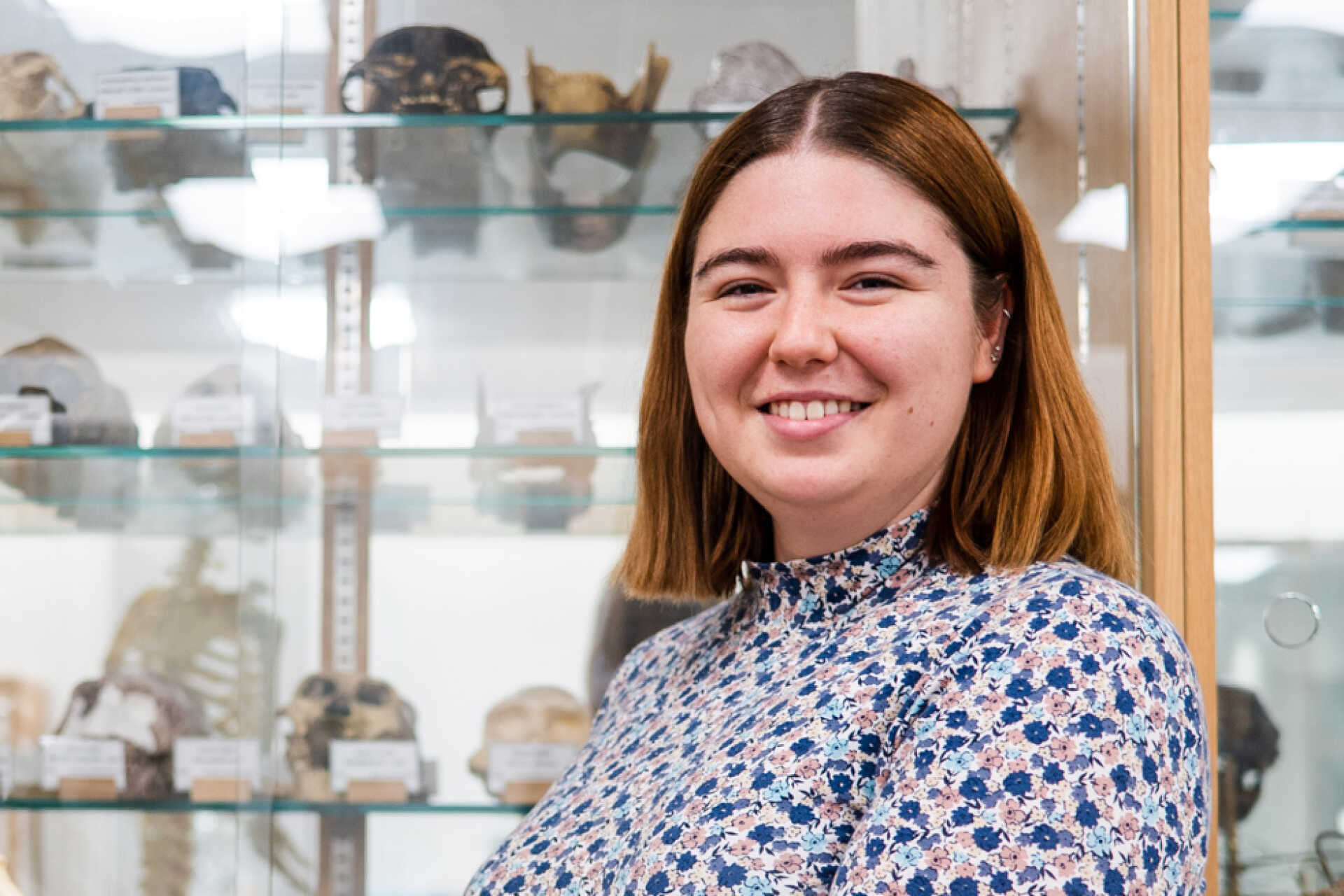
The 2024/25 annual tuition fees for this course are:
For details of when and how to pay fees and charges, please see our Student Finance Guide.
For students continuing on this programme, fees will increase year on year by no more than RPI + 3% in each academic year of study except where regulated.*
The University will assess your fee status as part of the application process. If you are uncertain about your fee status you may wish to seek advice from UKCISA before applying.
Fees for undergraduate students are £1,850.
Fees for undergraduate students are £1,385.
Students studying abroad for less than one academic year will pay full fees according to their fee status.
One day trips that are compulsory to a module are financially funded by the School. Optional or longer trips may require support funding from attendees.
Find out more about accommodation and living costs, plus general additional costs that you may pay when studying at Kent.
Kent offers generous financial support schemes to assist eligible undergraduate students during their studies. See our funding page for more details.

We have a range of subject-specific awards and scholarships for academic, sporting and musical achievement.
We welcome applications from students all around the world with a wide range of international qualifications.
Student Life

In the QS World University Rankings 2024, Kent has been ranked 39th within the UK and is in the top 25% of Higher Education Institutions worldwide.
Kent Sport
Kent has risen 11 places in THE’s REF 2021 ranking, confirming us as a leading research university.

An unmissable part of your student experience.